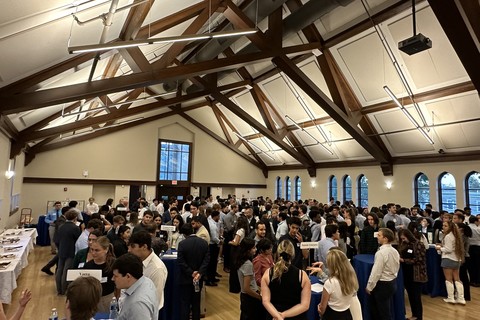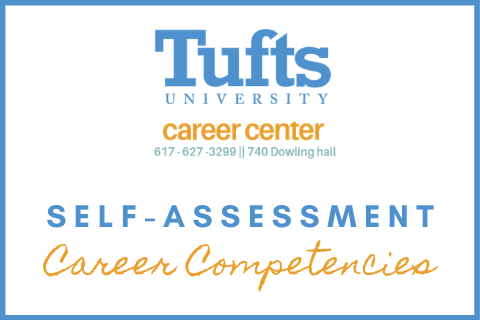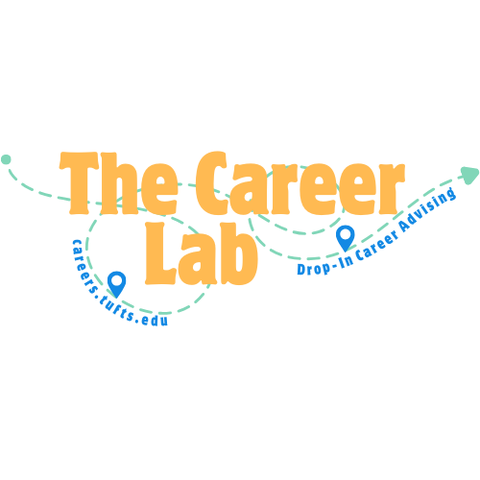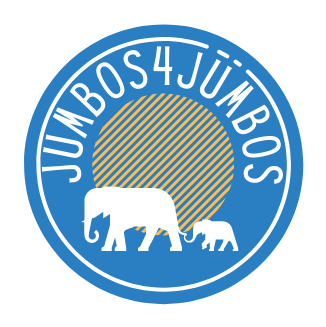What is career readiness?
Career readiness is the attainment and demonstration of competencies that broadly prepare college graduates for a successful transition to the workplace. Think about the competencies that enable you to succeed. These can include broader areas such as global/intercultural fluency or leadership, but can also encompass what we and many employers refer to as transferable skills, such as the ability to work in a team.
All competencies can be developed over time through a variety of experiences (community service, internships, student clubs, coursework) and apply to many career fields.
Based on competencies developed by the National Association of Colleges and Employers (NACE), the Tufts Career Center is committed to helping students develop/enhance the following competencies:
- Critical Thinking
Exercise sound reasoning to analyze issues, make decisions, and overcome problems. The individual is able to obtain, interpret, and use knowledge, facts, and data in this process, and may demonstrate originality and inventiveness.Strategies for developing this competency:
- Take research-based classes or work in one of Tufts’ many labs; consider applying to the Tufts Summer Scholars Program.
- Watch “5 Tips to Improve Your Critical Thinking” (a Ted-Ed Talk from Samantha Agoos).
- Join a hackathon — both technical and non-technical fields are represented! — and boost many competencies in a single weekend (to learn more, read Hackathons for Good: Why You Should Attend One; 7 Surprising Ways a Hackathon Will Boost Your Employability; Hackathons Aren’t Just for Coders; and view upcoming hackathons).
- Volunteer or work as a tutor, assisting peers or K-12 students in the community with various academic subjects.
- Communication
Articulate thoughts and ideas clearly and effectively in written and oral forms to persons inside and outside of the organization. The individual has public speaking skills; is able to express ideas to others; and can write/edit memos, letters, and complex technical reports clearly and effectively.Strategies for developing this competency:
- Ask family, friends and trusted advisors to critique your writing and offer suggestions for improvement; talk with a writing consultant in the Academic Resource Center (ARC) about ways to improve your writing.
- Watch “The 7 Cs of Communication” (a short video from MindTools Videos, along with this accompanying article) and “10 Ways to Have a Better Conversation” (a Tedx Talk from Celeste Headlee)
- Check out the list of Student Organizations at Tufts and think about joining one that will allow you to strengthen your communication skills, perhaps a student publication, Debate Society or Mock Trial
- Schedule a mock interview with the Career Center to practice answering interview questions aloud; visit our drop-in hours for quick cover letter and resume critiques
- Give campus tours to prospective students as a Tour Guide with Undergraduate Admissions
- Join a group through Meetup.com, giving you the opportunity to interact with a wider range of people
- Find a Toastmasters Club as another way to develop your communication skills through public speaking
- Civic Engagement / Identity
Work with others to define, analyze, and address public, political, or community problems. The individual is able to deliberate with others, collaborate to make change, and form relationships that manifest such civic virtues as tolerance and respect.
Strategies for developing this competency:
- Join Student Government and address campus-wide issues
- Get involved with the Tisch College of Civic Life and its many endeavors, e.g., The Center for Information and Research on Civic Learning & Engagement (CIRCLE)
- Watch “Your Engagement Matters” (a Tedx Talk from Jefferson Smith)
- View research and read articles from the Stanford Center on Philanthropy and Civil Society and watch short videos on Active Citizenship in the Digital Age
- Think about volunteering or interning with a political campaign or social service agency
- Stay current with local and national news; read articles from reputable sources and allow yourself to be challenged
- Look for ways to engage with the civic life of the University, e.g., by attending events from the Distinguished Speaker Series
- Teamwork
Build collaborative relationships with colleagues and customers representing diverse cultures, races, ages, genders, religions, lifestyles, and viewpoints. The individual is able to work within a team structure and can negotiate and manage conflict.
Strategies for developing this competency:
- Join a team and remember that teams take many forms (e.g., a student club or organization, sports team, volunteer group); create your own team by forming a study group with peers
- Think about using a Responsibility Assignment (RACI) Matrix to make sure each task is assigned to someone and each person knows what to do (for more information about using this tool, including examples, visit this site or this site)
- Take a Tufts Mountain Club trip to the Loj
- Watch “How to Turn a Group of Strangers into a Team” (a Ted NYC Talk from Amy Edmonson)
- Organize an abroad or domestic volunteer service trip during a school break
- Technology
Leverage existing digital technologies ethically and efficiently to solve problems, complete tasks, and accomplish goals. The individual demonstrates effective adaptability to new and emerging technologies.
Strategies for developing this competency:
- Access thousands of online courses and training videos through the Udemy Online Learning Platform, MIT Courses on edX, and MIT OpenCourseWare
- Use free resources to learn programming languages and/or coding (Codecademy; R programming resources: here, here, or here)
- Create, write, and maintain a blog while studying or traveling abroad
- Maintain social media pages for a club or organization
- Create and maintain a LinkedIn profile and connect with Tufts alumni through the Tufts University Career Network on LinkedIn
- Equity and Inclusion
Value, respect, and learn from diverse cultures, races, ages, genders, sexual orientations, abilities, and religions. The individual demonstrates openness, inclusiveness, sensitivity, and the ability to interact respectfully with all people and understand individual differences.
Strategies for developing this competency:
- Learn about Tufts program options for study abroad and review the many student cultural organizations at Tufts
- Access this Multicultural Training Database from the American Psychological Association and this Intercultural Activity Toolkit from the Association of International Educators for helpful activities, videos and reading material
- Read “3 Ways to Improve Your Cultural Intelligence” and other articles about cultural understanding
- Check out programs offered by the Group of Seven, e.g., the International Center’s Intercultural Conversation Program
- Read more about Diversity and Inclusion and Global Leadership, two of the Tufts strategic themes
- Use this resource for assistance in planning activities or icebreakers that are culturally sensitive
- Leadership
Leverage strengths of others to achieve common goals and use interpersonal skills to coach and develop others. The individual is able to assess and manage emotions; use empathetic skills to guide and motivate; and organize, prioritize, and delegate work.
Strategies for developing this competency:
- Volunteer to lead a small group, whether in class or for a student club or organization; participate in service programs through the Leonard Carmichael Society and other student and community organizations
- Apply to be a peer leader for a pre-orientation program
- Read Leading Effectively articles on a variety of topics from the Center for Creative Leadership and these Five Practices of Exemplary Leadership from The Student Leadership Challenge
- Read this Leadership Skills List and think about which qualities best exemplify your preferred style of leadership
- Watch “Great Leadership Comes Down to Only Two Rules” (Tedx Talk from Peter Anderton)
- Consider attending a Student Leadership Conference, whether in the Boston area or a nationwide program like the National Conference on Student Leadership
Remember, leadership can be demonstrated in many ways, both through more informal roles, as well as formal ones.
- Professionalism
Demonstrate effective work habits and personal accountability, e.g., working productively with others, practicing punctuality and time management, and understanding the impact of non-verbal communication on professional work image. The individual demonstrates integrity and ethical behavior, acts responsibly with the interests of the larger community in mind, and is able to learn from mistakes.
Strategies for developing this competency:
- Secure a paid or unpaid job or internship that will allow you to develop professional skills (review job & internship listings — includes on/off-campus and work study/non-work study jobs)
- Manage an event for a club or organization while sticking to a strict timeline
- Regularly curate your digital content to ensure that you’re presenting a professional image to potential employers and others
- Get involved with a pre-professional student organization
- Career and Self-Development
Identify and articulate one’s strengths, knowledge, and experiences relevant to the position desired and career goals and identify areas necessary for professional growth. The individual is able to navigate/explore job options, understands and can take the steps necessary to pursue opportunities, and understands how to self-advocate for opportunities in the workplace.
Strategies for developing this competency:
- Read through our Find an Internship and Find a Job sections to learn more about searching for positions
- Visit our Interviewing resources to strengthen your skills in preparation for conversations with potential employers
- Check out the Career Center calendar and attend skill-building workshops, networking events with alumni and employers, and more












